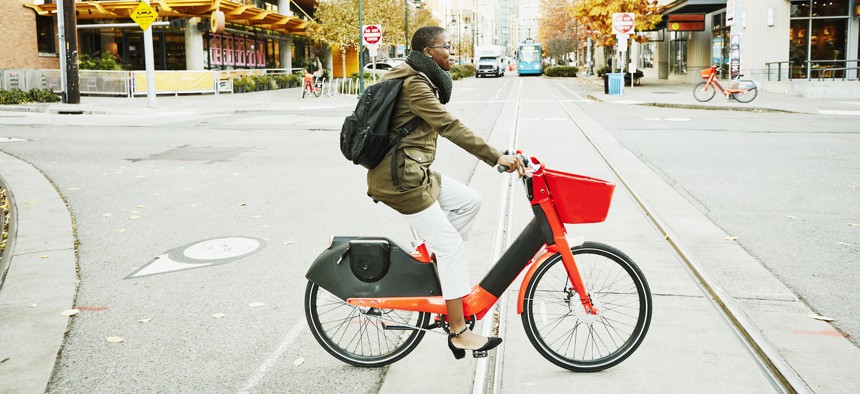E-bike pilots deliver micromobility travel insights, CO2 savings

GettyImages/Thomas Barwick
Colorado is collecting and analyzing e-bike travel data to learn how residents are using the fastest-growing form of electric vehicle transport and reducing their energy consumption.
With e-bikes growing in popularity, the Colorado Energy Office (CEO) is working with the Department of Energy’s National Renewable Energy Laboratory to collect and analyze e-bike travel data to learn how the fastest-growing form of electric vehicle transport is being used and impacting energy consumption.
Starting in 2021, CEO funded several pilot programs, including one that distributed e-bikes and e-bike-share memberships to low-income essential workers in diverse locations in the state. Each pilot tested different programs, models and incentives with their participants to capture various types of insights.
Participants used a customized version of NREL’s OpenPATH app, which automatically detected and passively collected data on participants’ travels. It created a travel diary and asked riders to label diary entries to find out how the e-bikes were being used and help evaluate carbon emissions savings, NREL explained in a recent news story.
In the Smart Commute pilot in Adams and Broomfield counties participants used e-bikes for a trial period before transitioning to full ownership. The pilot revealed a lack of compatible charging stations and bike racks where the vehicles could be securely left.
That insight led to the development of a database for e-bike-friendly resources. "Our thought was that if we were going to ask them to do [use e-bikes], then we needed to give them the right gear for them to be successful," said Jeanne Shreve, the e-bike program administrator for Smart Commute.
For the Roll-to-Restaurants pilot in Durango, CEO partnered with 4Core, a non-profit promoting energy efficiency for lower income residents. The pilot used a loan-to-own program to provide e-bikes and accessories to low-income restaurant and food service employees. Participants were asked to note their travels on the NREL app, and after several months of consistent data collection, participants would completely own the e-bike.
The dashboard on CanBikeCO shows a variety of metrics for Colorado’s six e-bike pilot programs, including trip count by purpose, e-bike trip frequency, the distribution of types of trips (in single vehicles, rideshare options or walking) replaced by e-bikes. It also graphs how e-bike energy use and emissions compare to other transit modes.
While the data gathered through the app has helped track carbon emissions, participants’ motivation to annotate their trips became a challenge. To address the decline in manual user input, an automatic labeling feature with an error gauge will be integrated into the next version of the app, NREL officials said.
As a result of the success of the Colorado e-bike pilots, the OpenPATH app is now broadly available to public agencies who can ask residents to install it on their smartphones and join local e-bike studies. The app features a built-in carbon footprint tracker so users can track their travel emissions and inform choices about sustainable options. The open-source tool can also be modified for more specific studies.
The data captured by the OpenPATH tool can help policymakers support the growth of the micromobility market, which can help meet the needs of underrepresented and remote communities and contribute to reduction in greenhouse gas emissions.
“Travel mobility tends to focus on larger vehicles, and the lack of data revealing the travel behavior of people in these types of communities creates disparity for how infrastructure and transportation projects are funded,” said NREL's Andrew Duvall, project lead and transportation behavior analyst. “OpenPATH democratizes mobility data collection, which will enable policymakers to be more informed when making investment choices—such as adding a bike lane on a bridge when it's built, rather than expensive retrofitting; taking into account how people are traveling and ensuring energy-efficient options are factored into infrastructure.”
The findings from this pilot have already informed the creation of new e-bike incentive programs in Denver and e-bike loan programs in partnership with the New Haven, Connecticut, Clean Cities Coalition, NREL officials said.






